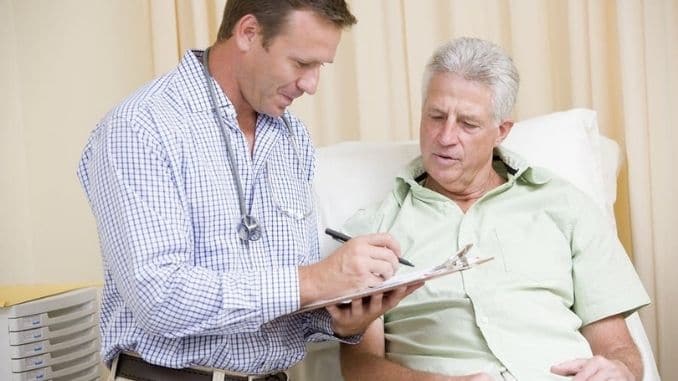
There are a few things that worry men more about their health than the tips for a healthy prostate. A lot of information gets circulated about the prostate, but is it all true? For instance, does an enlarged prostate increase your risk of prostate cancer? Should you ask your doctor to screen you for prostate cancer? These are some of the questions we’ll take a closer look at in this article. Caring for your prostate gland is important — let’s find out how and why.
What Is the Prostate Gland?
The prostate gland is located between your urinary bladder and the base of the penis. About the size of a walnut, the prostate has an outer consistency like a tennis ball. The urethra is a tube that drains the bladder, and it runs through the middle of the prostate then exits through the penis.
What Does the Prostate Do?
The prostate gland produces fluid that gets secreted during ejaculation. This prostatic fluid helps nourish and protect the sperm cells. Just prior to ejaculation, millions of sperm come from the testes through special tubes called the vas deferens, which connect to the prostate gland. The seminal vesicles also add fluid and the entire mix — fluid and sperm cells — is referred to as semen. Upon ejaculation, the prostate squeezes semen into the urethra, and the fluid then exits the penis.
One component of prostate fluid is an enzyme called prostate-specific antigen (PSA). This enzyme helps sperm swim by diluting the semen. PSA is also important in the screening and detection of prostate cancer which we’ll discuss later.
Because it’s located at the bladder exit, the prostate gland may also play a role in helping maintain urinary continence. However, if the gland gets enlarged or inflamed, this location may also lead to problems with urinary function.
Problems Associated with the Prostate Gland
The prostate gland can have several different problems, including:
- Inflammation: Called prostatitis, it is often caused by an infection; antibiotic treatment may help cure this condition
- Enlargement: This is referred to as benign prostatic hypertrophy (BPH), and it’s very common in men 50 years old and older; it is unknown why this enlargement occurs, but it may be due to changes in sex hormone levels with age; BPH can be treated with medications or surgery
- Cancer: Prostate cancer is the second-most common type of cancer in men, with skin cancer being number one; prostate cancer is very treatable if detected early; however, there is considerable debate about screening guidelines
Does an Enlarged Prostate Increase Your Risk for Cancer?
A lot of confusion surrounds the relationship between prostate enlargement and prostate cancer. There is no evidence that suggests an enlarged prostate increases your risk for prostate cancer. Part of the confusion is that BPH occurs in a large percentage of men age 50 and older. Some of these men will be diagnosed with prostate cancer, but there is no proven direct link. In fact, you can have a normal-sized prostate and still end up having prostate cancer.
The Symptoms of Prostate Enlargement
BPH symptoms are usually mild at first and can gradually worsen with age. The most common symptoms of prostate enlargement are:
- Urinary frequency: The need to urinate many times a day
- Urinary urgency: Feels like you need to urinate often
- Nocturia: The need to urinate more at night than usual
- Hesitancy: Trouble starting the stream of urine
- Incontinence: Decreased urine stream strength or the stream starts and stops
- Incomplete emptying: Slow or difficult to empty bladder completely
The Symptoms of Prostate Cancer
In many cases, early prostate cancer produces few or no symptoms at all. The symptoms of prostate cancer may be similar to those of BPH. Other symptoms of prostate cancer may include:
- Blood in semen
- Pelvic pain or discomfort
- Bone pain
- Erectile dysfunction
It’s important to know that these symptoms usually appear when prostate cancer is more advanced.
How Is Prostate Cancer Screened?
Prostate cancer can be detected by a physical exam. A doctor can feel the surface of your prostate by doing a digital rectal exam. Normally, the prostate is semi-firm and smooth. If one side of the prostate is enlarged or a hard bump is felt, it could be a sign of prostate cancer.
Another tool used in prostate cancer screening is the blood PSA measurement. High PSA levels may indicate the presence of prostate cancer, but a high PSA alone does not make the diagnosis. Other tests, such as ultrasound, MRI or CT scans can help detect cancers as well. The definitive diagnosis is made by taking a biopsy of the prostate and seeing cancer cells under a microscope.
Prostate Cancer Screening Debate
There’s a lot of controversy surrounding prostate cancer screening. Even though prostate cancer is very common and treatable when detected early, there’s also a problem of overdiagnosis and overtreatment. Many prostate cancers, if left alone, would never cause any harm or symptoms. The problem is trying to identify the more dangerous cancers.
If a doctor detects some kind of cancer, the obvious tendency is to treat it. However, surgery, radiation, and chemotherapy might end up doing more harm than good. On the other hand, an undetected aggressive cancer typically spreads to the bones and can be lethal.
Tips for a Healthy Prostate: At this time, most experts recommend that you make an informed decision after talking about the situation with your doctor. If you have a strong family history of prostate cancer, then screening may be recommended. For men in their late 70s and older, prostate cancer screening is discouraged. The reason is that in older men, even if prostate cancer is present, it’s usually slow growing. Older men are likely to have other health issues before prostate cancer causes any significant problems.
Do Antioxidants Prevent Prostate Cancer?
A lot of excitement surrounds the promise that antioxidants may prevent cancers, including prostate cancer. Even though the evidence appears to be inconclusive, it might not hurt to adjust your diet to include foods rich in antioxidants. The top antioxidant foods are:
- Blueberries
- Dark chocolate
- Pecans
- Artichokes
- Kidney beans
Some herbs and spices rich in antioxidants are:
- Cilantro
- Clove
- Cinnamon
- Oregano
- Turmeric
- Parsley
- Basil
You probably don’t need to take antioxidant supplements, but improving your diet with some of the foods listed above might help. Also, it’s best to avoid burnt meat. There may be a link between PhIP, a chemical found in charred meat and an increased risk of cancer.
Vitamin D and Prostate Cancer Prevention
Some evidence shows that lack of vitamin D may increase your risk for some aggressive forms of prostate cancer. The problem is that it’s hard to get vitamin D from foods and supplemental vitamins might not work either. The good news is that sunlight stimulates your skin to produce vitamin D.
Tips for a Healthy Prostate: Try to get about 15 minutes of direct sunlight two or three times per week. You should not use sunscreen when getting your weekly doses of sunlight. Be careful not to overdo it since excess amounts of ultraviolet ray radiation can increase your risk for skin cancer.
Obesity and Prostate Cancer
There have been several studies looking that the relationship between being overweight as a prostate cancer risk factor. It appears that the relationship might be related to age. A study in Norway following 950,000 men found that being obese can increase your risk of prostate cancer by about 9 percent. However, for men between the ages of 50 to 59, obesity increases the risk of prostate cancer by 58 percent. Also, obese men are more likely to die from prostate cancer than non-obese men with the same kind of cancer.
Conclusion
Many men will face some kind of prostate symptoms at some time in their life. In general, the best way to maintain your prostate health is through diet and by maintaining a healthy body weight. If you have a strong family history of prostate cancer, you should strongly consider routine screening. Otherwise, talk the situation over with your doctor and decide if you think prostate cancer screening is worth it.
For your guide to the best foods to heal your body, check out The Best Foods that Rapidly Slim & Heal in 7 Days, here!




